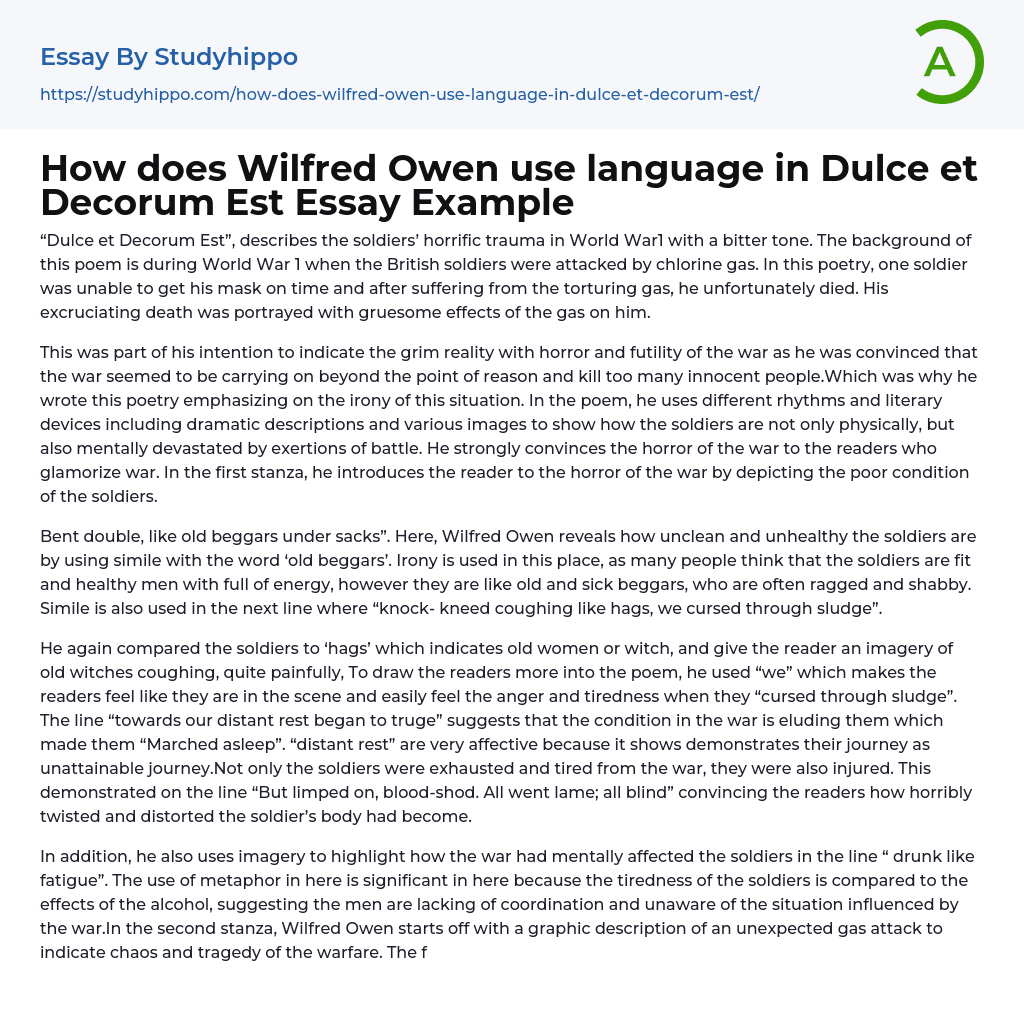

How does Wilfred Owen use language in Dulce et Decorum Est Essay Example
“Dulce et Decorum Est”, describes the soldiers’ horrific trauma in World War1 with a bitter tone. The background of this poem is during World War 1 when the British soldiers were attacked by chlorine gas. In this poetry, one soldier was unable to get his mask on time and after suffering from the torturing gas, he unfortunately died. His excruciating death was portrayed with gruesome effects of the gas on him.
This was part of his intention to indicate the grim reality with horror and futility of the war as he was convinced that the war seemed to be carrying on beyond the point of reason and kill too many innocent people.Which was why he wrote this poetry emphasizing on the irony of this situation. In the poem, he uses different rhythms and literary devices including dramatic description
...s and various images to show how the soldiers are not only physically, but also mentally devastated by exertions of battle. He strongly convinces the horror of the war to the readers who glamorize war. In the first stanza, he introduces the reader to the horror of the war by depicting the poor condition of the soldiers.
Bent double, like old beggars under sacks”. Here, Wilfred Owen reveals how unclean and unhealthy the soldiers are by using simile with the word ‘old beggars’. Irony is used in this place, as many people think that the soldiers are fit and healthy men with full of energy, however they are like old and sick beggars, who are often ragged and shabby. Simile is also used in the next line where “knock- kneed coughing like hags, we cursed through sludge”.
He again compare
the soldiers to ‘hags’ which indicates old women or witch, and give the reader an imagery of old witches coughing, quite painfully, To draw the readers more into the poem, he used “we” which makes the readers feel like they are in the scene and easily feel the anger and tiredness when they “cursed through sludge”. The line “towards our distant rest began to truge” suggests that the condition in the war is eluding them which made them “Marched asleep”. “distant rest” are very affective because it shows demonstrates their journey as unattainable journey.Not only the soldiers were exhausted and tired from the war, they were also injured. This demonstrated on the line “But limped on, blood-shod. All went lame; all blind” convincing the readers how horribly twisted and distorted the soldier’s body had become.
In addition, he also uses imagery to highlight how the war had mentally affected the soldiers in the line “ drunk like fatigue”. The use of metaphor in here is significant in here because the tiredness of the soldiers is compared to the effects of the alcohol, suggesting the men are lacking of coordination and unaware of the situation influenced by the war.In the second stanza, Wilfred Owen starts off with a graphic description of an unexpected gas attack to indicate chaos and tragedy of the warfare. The first line, “Gas! Gas! Quick, boys! ” the pace changes completely compared to the first stanza where the pace was slow and arduous with the “trudging” march.
This structure shows the panic and urgency of the soldiers. The exclamation marks used In ‘Gas! Gas! ’ shows the attack was completely unexpected.During the
attack, a soldier who wasn’t able to get the mask on time was, “flound’ring like a man in fire or lime. This expresses how the soldier’s pain makes him suffer. A simile is used in “fire or lime” and this highlights the extent of his distress by showing the torture as giving the reader be more drawn into the scene. The soldier is said to be “drowning” as if the gas is drowning him in his lungs.
He described his distressful feeling in “in all my dreams, before my helpless sight” This line clearly emphasizes his irritation as he have to relive the experience in his dreams like a nightmare.Throughout the poem, Wilfred Owen had created a sense of injustice and anger towards the terrific conditions and events applied to the soldiers by using various kinds of literary devices including simile, metaphor, rhyme and alliteration. In order to convince the readers of horror of the war more effectively, he used words, which involves them in the situation by using the word “you”. At the end of the poem, he ends with an ironic statement "The old Lie: Dulce et decorum est Pro patria mori.
" Which means the notion of it being ‘sweet and fitting’ to die in the war is untrue. This ending shows his true anger and bitterness towards the war.
- Book Summary essays
- Metaphor essays
- Reader essays
- Rhyme essays
- Literary devices essays
- Villain essays
- Books essays
- Genre essays
- Literary Criticism essays
- Writer essays
- Protagonist essays
- Simile essays
- Poem essays
- Book Report essays
- Book Review essays
- Greek Mythology essays
- Plot essays
- Tragic Hero essays
- Coming of Age essays
- Play essays
- Rhetoric essays
- Rhetorical Question essays
- Translation essays
- Understanding essays
- Reason essays
- Character essays
- Letter essays
- American Literature essays
- Literature Review essays
- Utopia essays
- Poetry Analysis essays
- Dante's Inferno essays
- Between The World and Me essays
- Incidents in The Life of a Slave Girl essays
- Flowers for Algernon essays
- Myth essays
- Everyday Use essays
- Boo Radley essays
- Genesis essays
- Richard iii essays
- Alice in Wonderland essays
- On the road essays
- Ozymandias essays
- The Nightingale essays
- Holden Caulfield essays
- Animal Farm essays
- 1984 essays
- A Hanging essays
- Shooting An Elephant essays
- A Tale Of Two Cities essays



